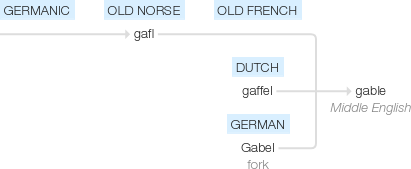Gable
Middle English: via Old French from Old Norse gafl, of Germanic origin; related to Dutch gaffel and German Gabel ‘fork’ (the point of the gable originally being the fork of two crossed timbers supporting the end of the roof-tree).
wiktionary
The southern English term gable probably came from Old French gable (compare modern French gâble), from Old Norse gafl. The northern form gavel is perhaps also akin to Old Norse gafl, masculine, of the same meaning (confer Swedish gavel, Danish gavl). See gafl for more etymology information.
gable (plural gables)
etymonline
gable (n.)
"end of a ridged roof cut off in a vertical plane, together with the wall from the level of the eaves to the apex," mid-14c., "a gable of a building; a facade," from Old French gable "facade, front, gable," from Old Norse gafl "gable, gable-end" (in north of England, the word probably is directly from Norse), according to Watkins, probably from Proto-Germanic *gablaz "top of a pitched roof" (source also of Middle Dutch ghevel, Dutch gevel, Old High German gibil, German Giebel, Gothic gibla "gable"). This is traced to a PIE *ghebh-el- "head," which seems to have yielded words meaning both "fork" (such as Old English gafol, geafel, Old Saxon gafala, Dutch gaffel, Old High German gabala "pitchfork," German Gabel "fork;" Old Irish gabul "forked twig") and "head" (such as Old High German gibilla, Old Saxon gibillia "skull"). See cephalo-.
Possibly the primitive meaning of the words may have been 'top', 'vertex'; this may have given rise to the sense of 'gable', and this latter to the sense of 'fork', a gable being originally formed by two pieces of timber crossed at the top supporting the end of the roof-tree. [OED]
Related: Gabled; gables; gable-end.
